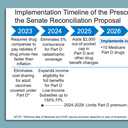Dems on the brink of sweeping Medicare changes

Democrats are on the cusp of making the most significant changes to Medicare in more than a decade, which would bring lower drug prices and out-of-pocket costs for some of the program's 64 million enrollees.
Why it matters: New limits on how much patients will have to pay for medicines annually could offer a lifeline to seniors with conditions like cancer or multiple sclerosis who face thousands of dollars in drug bills, and lower overall prices would provide relief to even more enrollees.
The big picture: Nearly 1.5 million would benefit from a $2,000 cap on out-of-pocket spending in Medicare's Part D drug benefit, and 1.3 million from the elimination of a requirement they pay 5% of total drug costs if they exceed a catastrophic coverage threshold, the Kaiser Family Foundation estimates, based on 2020 data.
Yes, but: While the bill is projected to save taxpayers hundreds of billions of dollars over the next decade, opponents of the bill argue these savings won't be felt by patients.
- The legislation also wouldn't touch prices in the commercial insurance market, where most Americans get coverage through work.
- It would only open up negotiations for a small number of drugs that are years past their FDA approval or licensure date, but estimates project that some of the drugs that cost the program the most money will be eligible for negotiations.
At least some of the policies could provide a tonic to seniors on fixed incomes who've been rattled by soaring prices and economic anxiety.
- Beginning this fall, it would penalize drug companies who raise prices faster than inflation, and starting next year, would eliminate out-of-pocket costs for adult vaccines covered under Medicare's Part D drug benefit.
- In 2024, the legislation would strike the 5% coinsurance requirement for catastrophic coverage while expanding eligibility for low-income subsidies.
- By 2025, it would cap out-of-pocket spending in Part D to $2,000.
- And beginning in 2026, it would trigger direct government negotiations with manufacturers, making 10 yet-to-be-determined high-cost drugs subject to spending controls. That number would rise to 15 in 2027 and 20 in 2029.
From 2024 to 2029, the Democrats' plan would limit premium growth in the Part D program to 6%.
- It also would delay the Trump administration's regulations on drug rebates that address payments drugmakers offer to pharmacy benefit managers to get products on their formularies.
The other side: The pharmaceutical industry argues such negotiations would quash innovation and cut off venture capital funding for promising cures.
- The Congressional Budget Office estimates that 15 out of 1,300 drugs, or 1%, would not come to market over the next 30 years as a result of the drug provisions in the bill.
The bottom line: The Democrats' plan caps years of futile efforts to change the drug pricing equation and, despite its limitations, lets Medicare for the first time use its purchasing power.